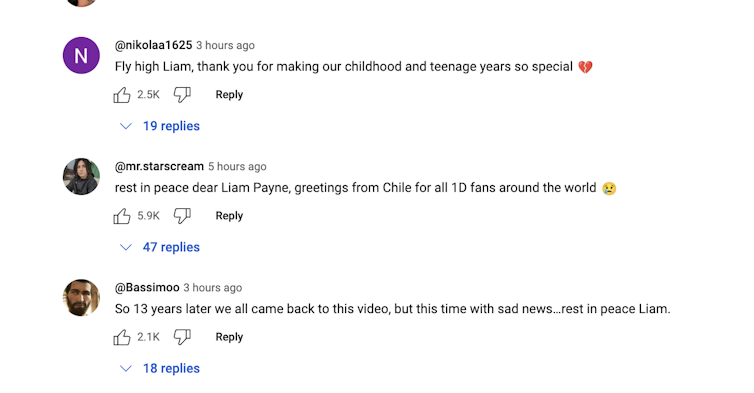
Former One Direction band member and solo artist Liam Payne has been found dead outside a hotel in Buenos Aires, media reports have confirmed. Payne was just 31 years old – a loved friend and father.
Alongside his former One Direction band mates Niall Horan, Harry Styles, Louis Tomlinson and Zayn Malik, Payne had a huge influence on popular culture in his home country of the United Kingdom and internationally.
The group formed in 2010 on the British talent show X Factor and stayed together for about five years before officially splitting in 2016. Throughout this time, Payne remained a valuable member of the band and a clear talent in his own right.
After the split (and a brief hiatus from music-making), Payne continued to release music periodically as both a songwriter and collaborator. He most recently released the single Teardrops in March, ahead of an anticipated second solo album.
News of Payne’s death has led to an outpouring of tributes. Like many young people thrust into stardom seemingly overnight, his life wasn’t without controversy. But the response to his death by fans and industry colleagues alike is proof of the impact he had.
The making of a pop supergroup
While One Direction may have not been together for as long as other globally successful acts, their influence far exceeded bands that have been together for decades. They released five studio records – and broke many more, including six Guinness World Records. And even though they didn’t make it to their 10th anniversary together, they had still sold some 70 million records by 2020.
In the years since the split, fans continued to gather, listen and celebrate – with the most recent anniversary (14 years) seeing fan-led events held in Australia and the rest of the world.
It’s easy to dismiss pop music and its influence, especially in the face of what feel like increasingly dire global circumstances. But pop, like many other forms of entertainment, provides a practical way for people to gain momentary pleasure and comfort.
It also provides connection with others – and relief from politics and other daily pressures. For example, one of One Direction’s biggest hits, That’s What Makes You Beautiful, sought to empower young people who might otherwise be overwhelmed by negative messaging.
Within a year of their debut, the group was met with massive crowds of fans almost everywhere they want.
The impact on fans when their idol dies
The loss of life, especially a young person’s life, is always a tragedy.
For some young fans, this might be the first person they “know” who has died. While it may not be the same as losing a family member or close friend, the feeling of loss is significant. Young fans will need support. And in 2024, many will find this support through social platforms and online forums.
I still remember the impact the deaths of stars such as Kurt Cobain and Jeff Buckley had on people like me who were teenagers in the 1990s. These were artists I admired and listened to – and whose art I relied on during times of pleasure and pain.
A similar pang was felt when artists such as George Michael, Aretha Franklin and David Bowie died, albeit later in my life and theirs.
The experience of losing a music idol is in many ways a universal one. People whose art we attach to our own life experiences become inseparable from our lives. And when they die, it can feel like those experiences are over too.
After news of Payne’s death broke, hundreds of fans took to the streets of Palermo in Buenos Aires, where Payne had been visiting. They held a vigil, cried and consoled one another in front of the Casa Sur hotel where Payne had been staying.
One fan, 25-year-old Yamila Zacarias, probably spoke for many when she said:
He meant a lot to me because the band came into my life at this time when you’re trying to be a part of something, and being a One Direction fan became that something for me.
Lifelong fandom and memories
There’s a stereotype of “fans” as hordes of screaming girls, which can really take away from the depth of fandom.
Anyone at any stage of life can be a fan of just about anything. And the best thing about fandom is that it can, and often does, allow lots of different types of people an outlet for connection throughout their lives.

YouTube/screenshot
The death of US actress Betty White in 2021, as sad as it was, brought people across generations and walks of life together. And not just those who knew her personally, but those who had connected with each other through their love of her work. It reminded me of my own family, including my Nan and Dad, now gone, and the laughs we’d share as we watched her.
As more details and tributes to Payne’s life and death emerge, the fans will have each other to lean on. If you yourself know someone who is a fan of Payne or One Direction, even reaching out to just acknowledge that person’s grief and experience is important. It says to them, “what you love is valid, and so are you”.
Liz Giuffre, Senior Lecturer in Communication, University of Technology Sydney.
This article is republished from The Conversation under a Creative Commons license. Read the original article.



